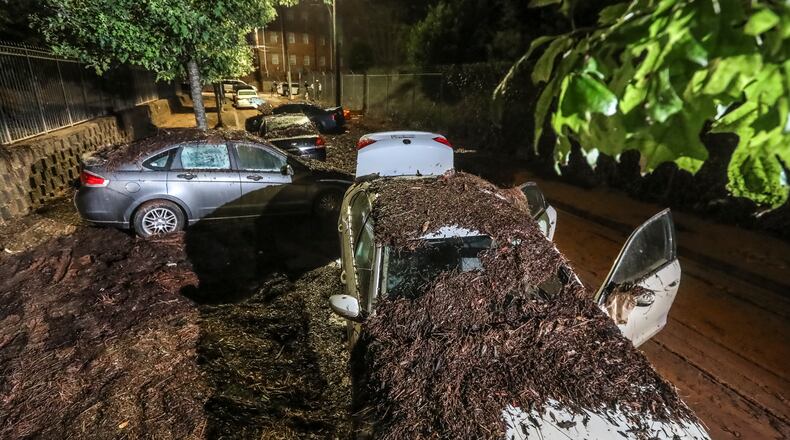In a guest column, Clark Atlanta University senior Jacqueline Azah talks about recent flooding at the campus and her frustrations over the government response.
Azah works with the Georgia Youth Justice Coalition in youth mobilization. A political science major, she is also active with Students Demand Action, which seeks to end gun violence.
By Jacqueline Azah
Two weeks ago, my campus flooded. I was drenched and stepping over puddles but knew I needed to make it to class. Clark Atlanta University is built on a hill. As I ran to my class at the top, water was flooding past me toward the end of campus. When I walked into a half-filled classroom, I realized I was somehow one of the few students who made it on time.
One by one, my classmates started to roll into the room with mud-covered shoes, soaked jeans, and out-turned umbrellas. Thirty, 40 and then 60 minutes passed until we were able to start class. Our professor tried to keep our attention and move on with lesson plans. However, as much as we all wanted it to be class as usual, most of us ended up anxiously peeking out the window, watching our campus flood while trying to check in on our friends.
We spent most of the period sending each other social media posts that captured the worst of the flooding. Whispers of “Oh my God, have you seen this?” ran through the classroom. One of my friends passed me their phone to watch a video of three students in my former freshman dorm trying to force their way out of the building. I later discovered the storm destroyed a close friend’s car entirely. Another classmate lost part of their home.
Yet, it seemed like nobody but Clark Atlanta students and our West End neighbors were hearing of the devastating impact. It seemed like there was no widespread support, no influx of donations outside of HBCUs and local schools and barely any news coverage. I wish I could say this situation felt new to us, but it did not. It is an old, familiar pattern.
Credit: Contribute
Credit: Contribute
The night before my first day of classes at Clark Atlanta University, I got caught up in a shooting. An unknown person drove by, shooting through a crowd of young people. That scene still lives in my head. Earlier last semester, a similar shooting took a student’s life. Tragedies like these across Clark Atlanta are not uncommon. Yet, we students are typically the only ones who hear about them and the only ones rallying for solutions. We are tired of the lack of support. We need change.
Vice President Kamala Harris recently made an appearance at Morehouse College. While Harris briefly mentioned the flooding, she and other politicians seldom offer meaningful solutions.
Here in Atlanta, Mayor Andre Dickens ignored hundreds of students who spoke out against the $90 million training facility pushed through by the Atlanta City Council. And Dickens has failed to adequately address the gun violence crisis that endangers young people like my classmates and me every day. Scenarios like these make me wonder how our elected officials can be trusted to lead when they refuse to listen to the actual needs of our community.
When I begin to reimagine support and safety in Black communities and across Atlanta, I see it as impossible for there to be just one solution. Too often, I feel like our communities are treated like a monolith, and communities like mine in the West End, where 23% of people live below the poverty line, are forced to fight over limited resources. Yet, to deliver real solutions, individuals and communities need to be heard.
The only Walmart near our campus, one of the few options for my classmates and me to buy groceries, closed down last year. We’ve had to look elsewhere for daily necessities for months. Next May, it’s set to reopen without any promise that it won’t close again, only with a prerequisite to include a heavily funded police substation to intimidate the few that chose to shop there.
As a student studying criminal justice, I’ve found that “public safety” often revolves around criminalizing people who look like me. Those sworn to protect and provide for us often target harmless acts instead of focusing on restorative methods that provide real solutions to these problems.
The city of Atlanta carries a deep history of working to deliver on the promise of our country for Black Americans. No HBCU student should feel neglected or cast aside because of systemic failures that continue to deprive students and youth of support and resources.
Instead, we must all work together to empower Black youth and invest in HBCUs including addressing decades of deliberate underinvestment in land-grant HBCUs like Fort Valley State University here in Georgia.
HBCU students know how to support one another: It’s time for our elected officials to also start supporting us.
About the Author
The Latest
Featured




